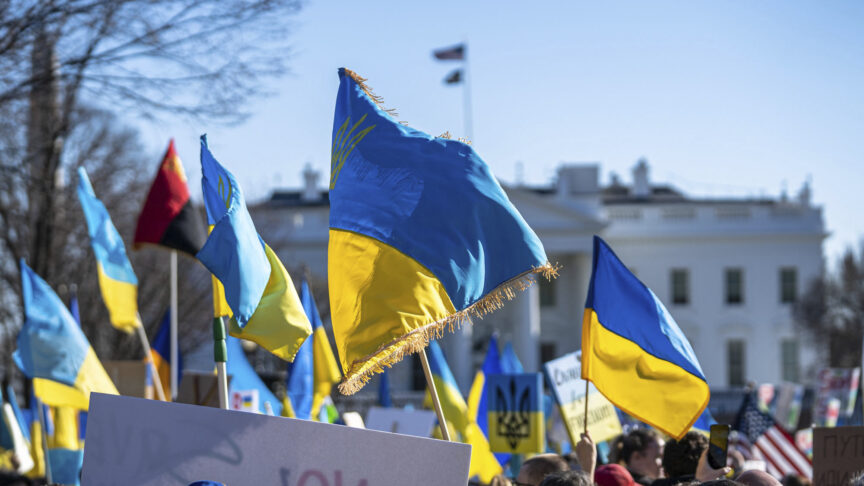The coming transatlantic rift over Ukraine
Europeans will have to put their money where their mouth is to maintain relations with the US over Ukraine – and deliver a ‘long war plan’, such as that proposed by ECFR
Senator Roger Marshall of Kansas enthusiastically joined the general outrage when Russia invaded Ukraine in February 2022. He took to Twitter immediately to condemn the attack as “the greatest breach of peace in Europe in nearly 80 years”. He went on a trip to Germany and the Polish-Ukrainian border in March to visit US troops and observe the humanitarian operations there. On his return, the Republican senator implored President Joe Biden to “get them the damn weapons”, while praising the contributions of Poland and Germany to the Ukrainian war effort as “heroic” and “ground-shaking”.
But just a few weeks later, his outrage had apparently faded. He was one of 11 senators to vote against the Biden administration’s proposed $40 billion aid package to Ukraine. In explaining his vote, Marshall noted that “our NATO allies’ contributions have dropped off significantly, turning this essentially into a proxy war between the U.S. and Russia.” In the House, Representative Tim Burchett of Tennessee wondered why the United States would send “$40 billion to Ukraine, and we can’t get baby formula? It’s time for Europe to step up.” A growing chorus of leading figures began to ask: if the rich Europeans are not going to adequately fund a war on the European continent, why should America do it?
The current trickle of “blame Europe” arguments may turn into a torrent if the Republicans take control of Congress in November
The bill still passed and – for now – only a minority of Republicans are taking this view. But, in private, administration officials doubt they will be able to pass big aid packages for Ukraine after the midterm elections. In their view, Congress has grown wary of the enormous sums required to sustain the Ukraine war, particularly given the various domestic priorities and the looming threat of China. President Vladimir Putin’s partial mobilisation of reservists means that the war will not end quickly. Administration officials expect budget-conscious Republicans to increasingly demand that Europe step up – and to point to Europeans’ inaction as a failure of Biden administration diplomacy. Even some anti-interventionist Democrats may join them.
One can see their point. The US has already pledged $44 billion in bilateral aid to Ukraine and the administration just asked Congress to approve another $13.7 billion. These are large figures even by Washington standards. Meanwhile, the combined contributions of the United Kingdom, the EU, and all 27 EU member states totals only $33 billion. In the key area of military aid, the gap is even wider: the US has pledged $24 billion, the Europeans only $12 billion. The actual difference may be greater, as key European donors have reportedly been slow to deliver on their pledges.
All this means that the current trickle of “blame Europe” arguments may turn into a torrent if the Republicans take control of Congress in November. The advantage of such claims is that they would allow newly empowered Congressional critics to oppose Biden’s policy without having to appear soft on Russia.
The new 2 per cent
None of this is new. The US has been complaining about Europe’s failure to contribute to its own security since the 1950s. In 2006, all NATO members agreed to spend at least 2 per cent of their GDP on defence. The failure of various European allies to meet this threshold became the source of numerous transatlantic rifts over the years.
The 2 per cent goal was always a poor gauge of a given country’s contribution to NATO’s common defence. It nonetheless became a central feature of disputes between America and Europe because it was a clear, visible, and measurable target that everyone had agreed to. Arguments that Europeans contributed, for example, more development aid than the US had the advantage of facts. But they had little resonance in Washington, where they sounded like pathetic efforts to wriggle out of a commitment.
The war in Ukraine has largely settled the 2 per cent debate, as most NATO members have effectively moved past that threshold. But, given Congressional reluctance to spend ever-greater sums on Ukraine, the broader issue will remain as acute as ever. It seems likely that, in Washington, the Ukraine military assistance numbers will provide a new measurable way to complain about Europe’s free-riding.
European officials will no doubt maintain that military assistance is not the only yardstick of support to Ukraine. They will point to the sizeable funds they are deploying to accommodate refugees in their countries and the vast cost of weaning themselves off Russian energy. As before, there is a strong logic there, but in Washington all this will sound like excuses for inaction. If European leaders take this route, this perennial argument could begin to dominate transatlantic summits and threaten Western unity over Ukraine and other issues.
To sustain US funding, Europeans need to proactively take the lead in giving assistance to Ukraine. Some colleagues and I at the European Council on Foreign Relations have outlined what this would take and recommended a four-part plan to seize the initiative on the war in Ukraine. This plan focuses on how Europeans can provide military assistance, security assurances, economic security, and energy security. There are many other options for doing this. But if Europeans do not adopt one of them, Ukraine could soon become a highly divisive issue within the transatlantic alliance.
The European Council on Foreign Relations does not take collective positions. ECFR publications only represent the views of their individual authors.
